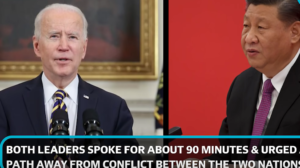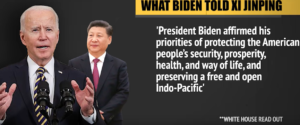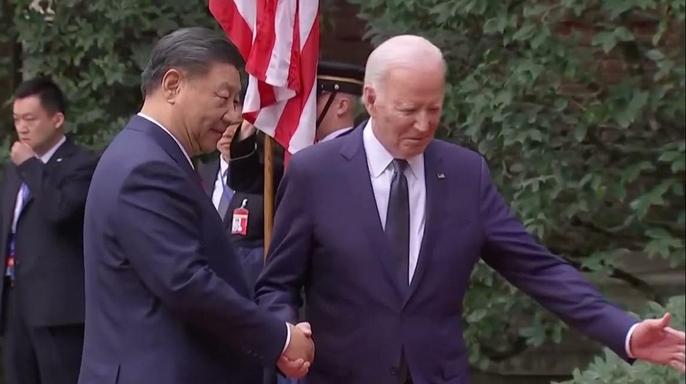Photos: YouTube Screenshots
The first face-to-face meeting in a year between Presidents Joe Biden and Xi Jinping went about as expected: some potentially meaningful agreements, some continuing disagreements, some controversies unexplored, and plenty of avowals to get along. Bottom line: No breakthroughs, but none expected.

Finding Common Ground
Xi’s message for the US is plain. He wants to convey the foundational idea that China is on a par with the US as a world leader, has interests that must be respected, and must have a cooperative relationship with the US in order to achieve global stability.
With an eye to his domestic audience, Xi appeared relaxed and very much the equal of Biden—at least as portrayed by the Chinese media. Biden’s message for China was not much different from Xi’s: the US and China have a global obligation to work together, and if Xi is prepared to meet some US concerns, the two countries can bridge the recent gap that has produced tensions and even predictions of inevitable conflict.
And they did bridge some gaps, three in particular: on the fentanyl trade, the climate crisis, and military talks. Xi agreed to target Chinese companies that export to Mexico the precursor chemicals used in the production of fentanyl. The US readout of the meeting notes the “establishment of a working group for ongoing communication and law enforcement coordination on counternarcotics issues.”
Xi and Biden also reached agreement to “pursue efforts to triple renewable energy capacity globally by 2030.” And—a very important turnabout by China—Xi agreed to resume three channels of military-to-military discussions as well as “telephone conversations between theater commanders.”
Restoring these military interactions is essential because of the dangerous situation in the South China Sea, where close encounters between Chinese and US aircraft and ships have raised the risk of a violent confrontation. Now, once the Chinese name a defense minister, the talks should resume.
Staking Out Interests
According to the US readout of the meeting, Biden reaffirmed the importance of the US security system that is expanding in the so-called Indo-Pacific region—the system the Chinese consider a reversion to containment. Biden “emphasized the United States’ enduring commitment to freedom of navigation and overflight, adherence to international law, maintaining peace and stability in the South China Sea and East China Sea, and the complete denuclearization of the Korean Peninsula.”
He reiterated the US commitment to defense of Ukraine and Israel; “raised concerns regarding PRC human rights abuses, including in Xinjiang, Tibet, and Hong Kong; and reassured Xi that the US, with regard to Taiwan, continues to support “one China” but urges that Taiwan-China differences be settled peacefully and “called for restraint in the PRC’s use of military activity in and around the Taiwan Strait.”
On trade, Biden restated US concerns about China’s “unfair trade practices” and said the US “will continue to take necessary actions to prevent advanced U.S. technologies from being used to undermine our own national security, without unduly limiting trade and investment.”
According to the official Chinese press account, Xi stressed the fundamental choice facing China and the US—either “zero-sum thinking” and competition that would mean a turbulent world, or increased cooperation to tackle the world’s problems. “The world can accommodate both China and the United States. China and the United States’ respective successes are opportunities for each other,” Xi said. He repeated what he had told Biden at Bali last year, that China was pursuing its own road of development, that it was not out to displace the US but would not tolerate pressure tactics.
Xi apparently did not respond to Biden’s policy comments on the Middle East war, Ukraine, Pacific security, North Korea, or human rights. Instead, Xi proposed five “pillars” of the relationship: mutual understanding and respect; establishment of effective avenues for dialogue; increase in cooperative undertakings, such as on climate change and artificial intelligence; acceptance of great-power responsibilities in regional and international organizations; and an increase in all kinds of exchanges, such as air traffic and people-to-people.
But Xi did not shy away from addressing what China considers the key sources of tension with the US. On Taiwan, which Xi said was the “most important and most sensitive issue” in the relationship, he urged that the US take “concrete actions,” including stopping arms sales to Taiwan.
Those sales have increased significantly as the result of bipartisan Congressional legislation. And on trade, Xi said that unfair US policies were “harming China’s just interests” and “constraining China’s high-quality development.” But the Chinese account did report favorably on Biden’s comments on the global importance of US-China cooperation and his reiteration of support for the one-China principle.
Partner or Competitor?
At the very spendy dinner for Xi that followed the summit, where corporate leaders paid $40,000 for a seat at the dais (versus only $2,000 to attend), Xi avoided current sources of US-China friction and instead recalled the years of friendly relations going back to World War II. His theme was friendship rather than, as Biden had emphasized, competition: “The number one question for us is: Are we adversaries, or partners?” Xi asked. “If one sees the other side as a primary competitor, the most consequential geopolitical challenge and a pacing threat, it will only lead to misinformed policymaking, misguided actions, and unwanted results.”
“China is ready to be a partner and friend of the United States,” Xi promised. That view is, of course, music to the ears of companies that are heavily invested in China.
After their meeting, Biden was asked if he still thought Xi was a dictator, referring to a previous time when Biden had called him that. Biden replied this time: “Well, look, he is.” That gaffe was, as far as I can tell, the only complication in what seems to have been a rather successful summit, exemplified by their pledge to expand people-to-people exchanges, increase the number of senior-level contacts, and work (in the words of the US readout) toward “finding a way to live alongside each other peacefully.”
Of course, the devil is in the details, but for now, a good start has been made toward resetting US-China relations.

Mel Gurtov, syndicated by PeaceVoice, is Professor Emeritus of Political Science at Portland State University and blogs at In the Human Interest.






